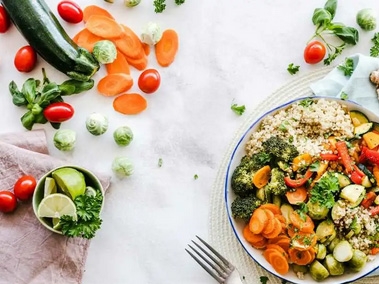Bronchiectasis is a chronic lung condition characterized by the permanent enlargement of parts of the airways. This can lead to symptoms like chronic coughing, shortness of breath, and excess mucus production. While medical treatments are essential, adopting a well-balanced diet and staying properly hydrated can also play a crucial role in managing bronchiectasis symptoms. Let’s explore how nutrition and hydration can help alleviate symptoms and improve overall quality of life for bronchiectasis patients.
Best Diet to Reduce Bronchiectasis Symptoms
The diet for bronchiectasis should focus on foods that support lung health, reduce inflammation, and help thin out mucus. A nutrient-rich diet can strengthen your immune system, making you less susceptible to infections that can worsen bronchiectasis symptoms. Some key components of an effective bronchiectasis-friendly diet include:
- High-Fiber Foods: Fiber-rich foods such as whole grains, fruits, and vegetables help regulate the digestive system, which can support your overall immune function.
- Antioxidant-Rich Foods: Foods like berries, citrus fruits, spinach, and broccoli are packed with antioxidants that reduce inflammation in the airways and help fight infections.
- Lean Proteins: Proteins are vital for muscle health, and patients with chronic lung conditions often require more protein to maintain strength. Include lean meats, fish, eggs, and plant-based proteins like beans and legumes.
- Omega-3 Fatty Acids: Found in fatty fish like salmon and mackerel, flaxseeds, and walnuts, omega-3s are anti-inflammatory and may help improve lung function.
- Spices and Herbs: Ginger, turmeric, and garlic have natural anti-inflammatory properties that can support respiratory health. These can be included in daily meals to boost the immune system.
While these foods support lung health, it’s equally important to avoid foods that can exacerbate bronchiectasis symptoms. High-sodium, processed, and sugary foods can increase inflammation and lead to dehydration, which can make mucus thicker and harder to clear.
How to Manage Bronchiectasis with Nutrition and Hydration
Proper nutrition is essential for managing bronchiectasis symptoms, but it works best when combined with adequate hydration. Hydration is crucial because it helps thin out the mucus in the airways, making it easier to clear out through coughing. This can prevent the buildup of mucus that often leads to infections.
Patients with bronchiectasis should drink plenty of water throughout the day to stay hydrated. In addition to water, other fluids such as herbal teas and clear broths can be beneficial. Avoiding caffeinated or alcoholic beverages is recommended, as they can cause dehydration and worsen symptoms.
Nutrition for bronchiectasis patients should be viewed holistically, with equal attention given to both the foods consumed and the amount of fluids taken in. A well-hydrated body allows nutrients to be absorbed more efficiently, supporting immune health and respiratory function.
Hydration Strategies for Patients with Bronchiectasis
Staying hydrated is one of the most effective ways to manage symptoms and prevent flare-ups in bronchiectasis. Here are some hydration tips for bronchiectasis patients:
- Drink Water Regularly: Aim to drink at least 8-10 glasses of water a day. Spread out your water intake throughout the day to maintain consistent hydration levels.
- Use a Humidifier: Dry air can irritate the airways and make it harder to clear mucus. Using a humidifier at home helps keep the air moist, which can ease breathing and keep your respiratory tract hydrated.
- Opt for Hydrating Foods: Incorporate fruits and vegetables with high water content, such as cucumbers, watermelon, and oranges, into your diet. These foods provide an extra source of hydration and are packed with vitamins that support lung health.
- Monitor Your Urine Color: A light yellow or pale straw color is a good indicator that you are well-hydrated. Darker urine may indicate that you need to drink more fluids.
Healthy Foods to Ease Bronchiectasis Symptoms
Certain foods have been shown to specifically help ease the symptoms of bronchiectasis. These foods not only support the immune system but also help in reducing inflammation and mucus production:
- Leafy Greens: Spinach, kale, and Swiss chard are rich in vitamins A, C, and K, which support lung health and reduce inflammation in the airways.
- Citrus Fruits: Oranges, lemons, and grapefruits are high in vitamin C, which can strengthen the immune system and help fight off infections.
- Garlic and Onions: Both garlic and onions contain compounds that help reduce inflammation and fight bacteria, which can be especially helpful for bronchiectasis patients prone to infections.
- Ginger: Known for its anti-inflammatory and soothing properties, ginger can help reduce coughing and ease irritation in the airways.
- Oily Fish: Salmon, mackerel, and sardines are rich in omega-3 fatty acids, which are known to reduce inflammation and improve lung function.
Incorporating these foods into your daily diet can go a long way in reducing the severity of bronchiectasis symptoms.
What to Eat and Drink if You Have Bronchiectasis
If you’re looking to optimize your diet for managing bronchiectasis symptoms, focus on whole, nutrient-dense foods and avoid anything that can lead to dehydration or increased mucus production. Here’s a quick guide to what you should eat and drink:
- Eat:
- Fresh fruits and vegetables, especially those high in fiber and antioxidants.
- Lean proteins such as chicken, turkey, fish, eggs, and plant-based sources.
- Whole grains like brown rice, oats, and quinoa to keep your energy levels stable.
- Foods rich in omega-3s to reduce inflammation.
- Drink:
- Plenty of water—aim for 2-3 liters per day.
- Herbal teas that can soothe the airways and provide additional hydration.
- Clear broths, especially during flare-ups, as they are both hydrating and nourishing.
- Avoid:
- Sugary drinks and processed foods that can worsen inflammation.
- Caffeinated or alcoholic beverages that can dehydrate you.
- Dairy products in large quantities, as they may thicken mucus for some individuals.
By adopting these dietary habits and staying hydrated, you can manage bronchiectasis more effectively and reduce the frequency of flare-ups. Always consult with your healthcare provider before making significant changes to your diet, especially if you are managing other health conditions alongside bronchiectasis.

